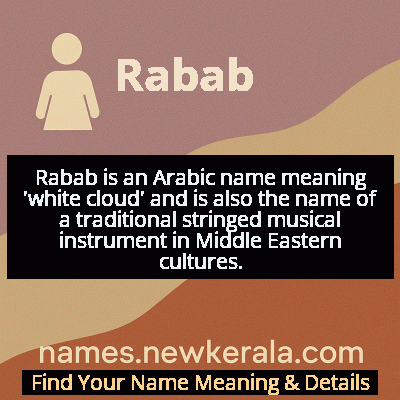Rabab Name Meaning & Details
Origin, Popularity, Numerology Analysis & Name Meaning of Rabab
Discover the origin, meaning, and cultural significance of the name RABAB. Delve into its historical roots and explore the lasting impact it has had on communities and traditions.
Name
Rabab
Gender
Female
Origin
Muslim
Lucky Number
6
Meaning of the Name - Rabab
Rabab is an Arabic name meaning 'white cloud' and is also the name of a traditional stringed musical instrument in Middle Eastern cultures.
Rabab - Complete Numerology Analysis
Your Numerology Number
Based on Pythagorean Numerology System
Ruling Planet
Venus
Positive Nature
Harmonious, responsible, caring, and artistic.
Negative Traits
Overly idealistic, superficial, possessive, or jealous.
Lucky Colours
Pink, turquoise.
Lucky Days
Friday.
Lucky Stones
Diamond, turquoise.
Harmony Numbers
2, 3, 9.
Best Suited Professions
Artists, musicians, teachers, healthcare workers.
What People Like About You
Warmth, nurturing nature, artistic flair.
Famous People Named Rabab
Rabab Al-Kadhimi
Poet and Writer
Prominent Iraqi poet known for her romantic and nationalist poetry, one of the first Arab women to publish poetry collections
Rabab Fetini
Diplomat
Moroccan diplomat serving as Director of Partnerships at UNESCO, known for her work in international relations and cultural preservation
Rabab Boudchich
Sufi Musician
Renowned Moroccan Gnawa musician preserving traditional spiritual music and performing internationally
Rabab Sadiq
Academic Researcher
Notable researcher in Middle Eastern studies focusing on women's education and cultural development in Muslim societies
Name Variations & International Equivalents
Click on blue names to explore their detailed meanings. Gray names with will be available soon.
Cultural & Historical Significance
Beyond its musical associations, Rabab represents the preservation of cultural identity in the face of modernization. Families who choose this name often do so to maintain connections to their ancestral heritage and artistic traditions. The name appears frequently in classical Arabic and Persian literature, often symbolizing beauty, elegance, and emotional depth. In contemporary contexts, Rabab has become a symbol of cultural pride and the enduring relevance of traditional arts in modern Muslim societies. The name's continued usage across generations demonstrates how cultural symbols can adapt while maintaining their essential meanings and significance.
Extended Personality Analysis
Individuals named Rabab typically exhibit a complex blend of artistic sensitivity, emotional intelligence, and quiet strength. Their personality often reflects the name's dual symbolism of the musical instrument and the white cloud—combining creative expression with ethereal grace. Rababs are usually highly intuitive and perceptive, able to read emotional undercurrents that others might miss. This makes them excellent mediators and trusted confidants, though they may need to protect their emotional boundaries to avoid being overwhelmed by others' feelings. Their creative nature often manifests in various artistic pursuits, from music and writing to visual arts and design.
In social settings, Rababs tend to be thoughtful observers rather than center-stage personalities. They form deep, meaningful relationships built on genuine connection rather than superficial interaction. While they may appear reserved initially, they possess strong convictions and inner resilience. Their problem-solving approach is often innovative, combining logical analysis with intuitive leaps. Rababs typically value harmony and avoid unnecessary conflict, though they will stand firm for their principles when necessary. Their combination of creativity, empathy, and quiet determination makes them natural leaders in creative fields, education, and community-building initiatives where emotional intelligence and cultural sensitivity are valued.
Modern Usage & Popularity
In contemporary naming practices, Rabab maintains a distinctive presence as a traditional yet uncommon choice that appeals to families seeking names with deep cultural roots and artistic associations. While not ranking among the most popular Muslim names globally, it enjoys consistent usage in countries like Morocco, Egypt, Pakistan, and among diaspora communities in Europe and North America. The name has experienced a modest revival in recent years as part of a broader trend toward rediscovering classical Arabic names with meaningful heritage. Social media platforms have helped maintain the name's visibility, with many young women named Rabab sharing their artistic creations, cultural insights, and professional achievements online. In multicultural societies, Rabab serves as a bridge between traditional values and modern identity, appealing to parents who want to honor their heritage while choosing a name that feels elegant and distinctive. The name's musical connections continue to resonate particularly with families involved in arts and culture, while its beautiful meaning and soft pronunciation make it accessible across linguistic boundaries.
Symbolic & Spiritual Meanings
The symbolic meanings associated with Rabab create a rich tapestry of spiritual and cultural significance that transcends its literal translation. As 'white cloud,' the name symbolizes purity, divine blessing, and the gentle, life-giving nature of rain-bearing clouds in arid regions. In Islamic tradition, clouds represent God's mercy and provision, while their white color signifies spiritual purity and enlightenment. The cloud symbolism also suggests transcendence—the ability to rise above earthly concerns while remaining connected to the world below, much like clouds float above the earth while nourishing it with rain. As a musical instrument, the rabab symbolizes the harmony of creation, the expression of deep emotion, and the connection between human and divine. Each component of the instrument carries symbolic weight: the strings represent the different paths of spiritual seeking, the bow symbolizes the guidance that moves the soul, and the resonating chamber represents the heart that amplifies spiritual experience. In Sufi poetry, the rabab's music often symbolizes the soul's longing for divine union, making the name particularly meaningful in spiritual contexts. Together, these symbolic layers create a name that represents creative expression, spiritual aspiration, emotional depth, and cultural continuity.

